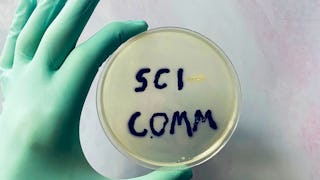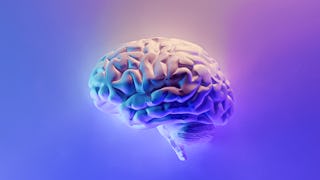In this course, you will explore different modalities of science communication, including oral presentations, written forms of communication, technology, and artistic media, including best practices for each.


您将学到什么
Explain best practices for oral, written, technological, and artistic forms of science communication.
Apply principles of learning engineering to design effective forms of science communication.
您将获得的技能
- Instructional Strategies
- Education and Training
- Education Software and Technology
- Creativity
- Human Learning
- Media and Communications
- Storytelling
- Writing and Editing
- Psychology
- Photo/Video Production and Technology
- Community Outreach
- Photography
- Liberal Arts
- Writing
- Driving engagement
- Science and Research
- Technical Communication
- Content Creation
- Oral Expression
- Persuasive Communication
要了解的详细信息

添加到您的领英档案
了解顶级公司的员工如何掌握热门技能

积累特定领域的专业知识
- 向行业专家学习新概念
- 获得对主题或工具的基础理解
- 通过实践项目培养工作相关技能
- 获得可共享的职业证书

该课程共有4个模块
Welcome to course 3! In the first module, you will learn important considerations for effective oral presentations, including best practices for giving live, recorded, and virtual presentations. In addition, we will also cover best practices for creating visual supports (poster, PowerPoint slides) to help communicate your message during an oral presentation. We will also discuss best practices for media interviews.
涵盖的内容
4个视频5篇阅读材料2个讨论话题1个插件
In this module, you will learn best practices for writing as a vehicle for science communication. Rather than focusing on grammar and general writing mechanics, this section will focus on how to effectively use the written form as a tool for science outreach, including how formal scientific writing varies from pieces for the general public.
涵盖的内容
3个视频3篇阅读材料2次同伴评审1个讨论话题
In this module, you will learn about technological forms of science communication outside traditional media (e.g. written or oral communication). In this module, we will discuss how science is communicated through various forms of educational technologies, including computer games, simulations, and social media. We will also briefly discuss learning analytics and their utility in understanding learning in technology-based environments.
涵盖的内容
4个视频1篇阅读材料2个讨论话题
In this module, you will learn about the importance of artistic forms of science communication. The arts can serve as an important gateway between scientists and the rest of society making difficult or abstract concepts feel more personal and less intimidating. Here, we will talk about use of art, such as photography as well as music to help feel others connected to science topics.
涵盖的内容
4个视频8篇阅读材料2次同伴评审1个插件
获得职业证书
将此证书添加到您的 LinkedIn 个人资料、简历或履历中。在社交媒体和绩效考核中分享。
位教师

从 Education 浏览更多内容
 状态:免费试用
状态:免费试用University of Colorado Boulder
 状态:预览
状态:预览University of Colorado Boulder
 状态:免费试用
状态:免费试用University of Colorado Boulder
 状态:免费试用
状态:免费试用University of Colorado Boulder
人们为什么选择 Coursera 来帮助自己实现职业发展




常见问题
To access the course materials, assignments and to earn a Certificate, you will need to purchase the Certificate experience when you enroll in a course. You can try a Free Trial instead, or apply for Financial Aid. The course may offer 'Full Course, No Certificate' instead. This option lets you see all course materials, submit required assessments, and get a final grade. This also means that you will not be able to purchase a Certificate experience.
When you enroll in the course, you get access to all of the courses in the Specialization, and you earn a certificate when you complete the work. Your electronic Certificate will be added to your Accomplishments page - from there, you can print your Certificate or add it to your LinkedIn profile.
Yes. In select learning programs, you can apply for financial aid or a scholarship if you can’t afford the enrollment fee. If fin aid or scholarship is available for your learning program selection, you’ll find a link to apply on the description page.
更多问题
提供助学金,
¹ 本课程的部分作业采用 AI 评分。对于这些作业,将根据 Coursera 隐私声明使用您的数据。

 中
中

